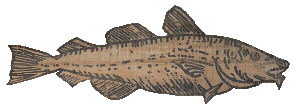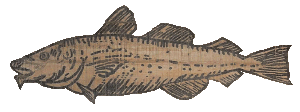Gorton-Pew


advertising

This coin holder shows an image of one of their codfish boxes, and would appear to date during the early years of the firm.

Boxes with lithographic printing became the common way to package the fish products. This box design was an updated version of one originally used by Slade Gorton prior to the merger of several firms in 1906.

(click on the image for a larger view)
"No Bones" was a key catch phrase used by Gorton-Pew Fisheries. Before merging with Gorton-Pew, Shute & Merchant claimed to be the largest boneless fish plant in the country.


a 1910 magazine ad

(click on the image for a larger view)
For a short period of time, the Gorton-Pew Fisheries also marketed its own glue. Fish skins were commonly used to make glue, so this was a way for the firm to use its own leftover product. It was very common for fish firms to sell off those skins and related fish materials needed for glue to businesses like the Russia Cement Company, which became part of the Gorton-Pew enterprise around 1918.

(click on the image for a larger view)
Around 1915 a board game called "Little Shoppers" was created, and the iconic Gorton-Pew codfish box was one of the tokens that could be used for playing.

